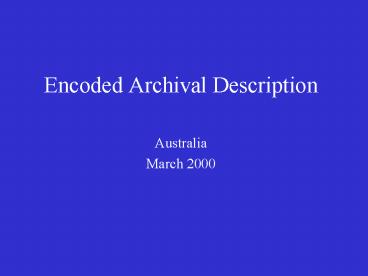Encoded Archival Description PowerPoint PPT Presentation
1 / 29
Title: Encoded Archival Description
1
Encoded Archival Description
- Australia
- March 2000
2
Presentation Overview
- Context archival principles and responsibilities
- What EAD is and is not
- Methodology
- Objectives
- Technology
- Administration and funding of EAD
- Who is implementing EAD?
- Future of EAD
3
Context Archival Principles and Responsibilities
- To remember
- To remember selectively
- To ensure authenticity of the remembered
- To document and preserve the context of the
creation - To make it as convenient as possible for others
to remember
4
For Whom?
- For legal institutions
- For history
- We define ourselves by what we choose to remember
and to forget - Remembering is a service
5
What Is EAD?
- An emerging encoding and structural standard for
archival description - Data structure
- Communication/interchange
- ISAD(G)
6
What EAD Is Not?
- Content standard
- Data value standard
- Archival management system
7
Development Methodology Intellectual and
Political
- Step 1 represent current archival description
using the new technology - Step 2 experience and understand the technology
and its potential to transform archival
description - Step 3 transform archival description
8
EAD Development
- 1993 FindAidAustralia was there from the
beginning NLA finding aids - 1995 Alpha
- 1996 Beta
- 1998 Version 1.0
9
Objectives
- Accurate representation of archival descriptive
principles and practice - Support intelligent indexing, access, and
navigation of archival materials - Reasonable assurance that information will endure
changes in hardware and software
10
Objectives
- Enable archives to easily communicate and share
information about - Related but different materials
- Dispersed materials
- Provide consistent and readily intelligible
description across repositories - Universal, union access to distributed collections
11
Universal, Union Access
- One place, any time, from any where
- Do relevant resources exist?
- Where do they exist?
- How can I get access to them?
- Convenience
12
Technology and Universal, Union Access
- Stereotype Jewetts Mud catalog
- Cards and printed catalogs union catalogs
- MARC from computer tapes to networked catalogs
- Standards for markup languages and networked
computing
13
Computers and Remembering Independence and
Dependence
- Storage medium separate from the presentation
medium - Attractive malleable, flexible, portable
- Dangerous dependency
- Challenge minimize the dependency
- Proprietary versus standard
- Procedural versus declarative or descriptive
encoding
14
Standards SGML and XML
- EAD is based on SGML and XML
- ISO and W3C
- XML normal SGML
- Broad and deep acceptance
- Descriptive first
- Procedures later communication, indexing,
display, transformation - Migration to new standard when it turns out we
have made a big mistake
15
Administration of EAD
- Society of American Archivistsintellectual and
political - Library of Congressmaintenance
- EAD Working Group
- Representatives from RLG, LC, Canada, UK, variety
of repositories in US - New representation Australia
- France, Germany, and Sweden?
16
Who is Implementing EAD?
- A National Database of Electronic Finding Aids
for Australian Literary Manuscript Collections - University of Western Australia
- National Library of Australia
- State Library of New South Wales
- University College UNSW at the Australian Defence
Force Academy - University of Queensland Fryer Library
- University of Sydney Library
17
Who is Implementing EAD?
- Library of Congress
- Online Archive of California (55 repositories)
- UK Public Record Office
- National Archive of Sweden
- Online Archive of New Mexico
- Virginia Heritage
- National Archives of Ireland
18
Who is Implementing EAD?
- University of Glasgow
- Duke University
- Durham University
- Oxford University
- Harvard University
- Yale University
- And many more repositories in North America,
Europe, Latin America, and South Africa
19
Funding
- US Department of Education
- Library of Congress NDL
- Council on Library and Information Resources
- Delmas Foundation
- National Endowment for the Humanities
- National Historic Publications and Records
Commission
20
Future of EAD
- Continue internationalization
- ISAD(G)
- Representatives from more nations/repositories
- Language
- Authority control ISAAR
- Yale Project Australia, Canada, US, UK, and
Sweden
21
EAD Listserv
- to subscribe, send a one-line message to
LISTSERV_at_LOC.GOV containing the text
SUBSCRIBE EAD YourName - once subscribed, submit messages to EAD_at_LOC.GOV
22
EAD Semantics and Structure
- An Overview
23
lteadgt lteadheadergt describes the
finding aid itself ltfrontmattergt
material for formally publishing finding aid
ltarchdescgt the description of the archival
unit lt/eadgt
24
ltdidgt brief descriptive identification of unit
ltadmininfogt administrative information
ltbioghistgt biography/history ltscopecontentgt
scope and content ltcontrolaccessgt controlled
access ltoddgt other descriptive data ltaddgt
adjunct descriptive data ltdscgt description of
subordinate components
25
ltdidgt ltoriginationgt ltphysdescgt
ltrepositorygt ltunitdategt
ltunitidgt ltunitlocgt ltcontainergt
ltunittitlegt ltabstractgt ltnotegt
26
ltadmininfogt ltaccessrestrictgt ltacqinfogt ltaltform
availgt ltappraisalgt ltcustodhistgt ltprefercitegt lt
processinfogt ltuserestrictgt ltaccrualsgt ltbioghist
gt ltchronlistgt
27
ltcontrolaccessgt ltcorpnamegt ltfamnamegt ltgeognamegt
ltfunctiongt ltoccupationgt ltpersnamegt ltsubjectgt
ltgenreformgt lttitlegt ltscopecontentgt ltarrangemen
tgt ltorganisationgt
28
ltaddgt adjunct descriptive data ltbibliographygt
ltfileplangt ltindexgt ltrelatedmaterialgt ltsepar
atedmaterialgt ltotherfindaidgt
29
ltdscgt description of subordinate components ltc01gt
description of component ltdidgt
ltadmininfogt ltbioghistgt ltscopecontentgt
ltcontrolaccessgt ltoddgt ltc02gt ... ltc03gt
... ltc04gt ... ltc12gt

